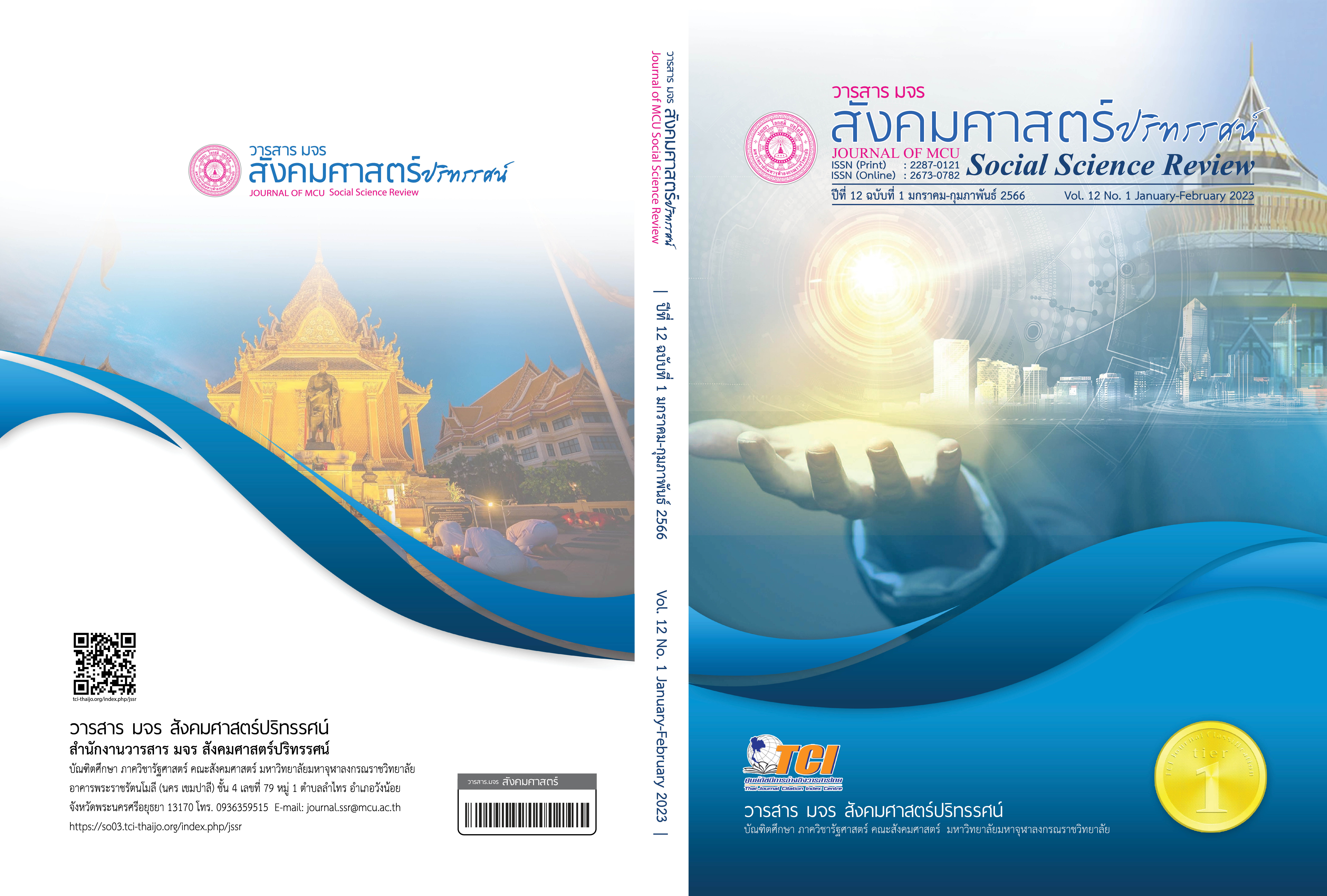การบูรณาการมังคุดกับแนวคิดขยะเป็นศูนย์ ผ่านนวัตกรรมการรังสรรค์ ตำรับอาหารใหม่ เพื่อยกระดับรายได้ให้แก่วิสาหกิจชุมชน ในกระบวนทัศน์ทางธุรกิจยุคใหม่
คำสำคัญ:
วิสาหกิจชุมชน, แนวคิดขยะเป็นศูนย์, สินค้าค้างคงคลังบทคัดย่อ
บทความวิจัยนี้มีวัตถุประสงค์เพื่อ 1) นำเสนอวิธีการลดต้นทุนในการกำจัดกากมังคุดและวิธีการแก้ไขปัญหาผลิตภัณฑ์มังคุดกวนค้างสต๊อกของวิสาหกิจชุมชน 2) นำเสนอตำรับอาหารใหม่ที่บูรณาการกับมังคุด 3) นำเสนอวิธีการเผยแพร่ตำรับอาหารใหม่ 4) แสดงสัมฤทธิ์ผลในการเพิ่มรายได้ให้กับวิสาหกิจชุมชนจากการขายผลิตภัณฑ์อาหารจากมังคุด กลุ่มประชากร ได้แก่ กลุ่มวิสาหกิจชุมชนบ้านสวนไร่ป๋า และกลุ่มวิสาหกิจชุมชนแปรรูปบ้านปลายคลอง การวิจัยนี้เป็นการวิจัยเชิงคุณภาพ ใช้การสัมภาษณ์ รวมถึงการถ่ายทอดองค์ความรู้ให้กับชุมชนเพื่อพัฒนาต่อยอดผลิตภัณฑ์อาหารจากมังคุด
ผลการวิจัยสรุปได้ว่า 1) วิธีการลดต้นทุนในการกำจัดกากมังคุด คือการใช้แนวคิด “ขยะเป็นศูนย์” (Zero Waste) โดยการผลิตตำรับอาหารที่ไม่หลงเหลือขยะ และวิธีการแก้ไขปัญหาผลิตภัณฑ์มังคุดกวน ค้างสต๊อก คือการใช้แนวคิด “การจัดการสินค้าค้างคงคลัง” (Deadstock Management) ซึ่งสามารถจัดการผลิตภัณฑ์ค้างสต๊อกให้ระบายออกไปได้ 2) ตำรับอาหารที่เกิดจากการบูรณาการกับมังคุด ได้แก่ น้ำพริกมังคุด ซอสมังคุด คัพเค้กมังคุด ข้าวเกรียบมังคุดกวน และ คุ้กกี้มังคุดกวน 3) รูปแบบการเผยแพร่เพื่อการตลาดและธุรกิจยุคใหม่ คือ สารานุกรมตำรับอาหารในรูปแบบหนังสืออิเล็กทรอนิกส์ (e-book) 4) รายได้ของกลุ่มวิสาหกิจชุมชนบ้านสวนไร่ป๋า จากน้ำพริกมังคุด และรายได้ของกลุ่มวิสาหกิจชุมชนแปรรูปบ้านปลายคลอง จากซอสมังคุด เพิ่มขึ้น ร้อยละ 10
เอกสารอ้างอิง
กรมเจรจาการค้าระหว่างประเทศ. (2563). กรมเจรจาฯ เผย FTA ดันส่งออกมังคุดไทยขยายตัวต่อเนื่อง. สืบค้น 30 กันยายน 2563, จาก https://www.dtn.go.th/th/news.
ณชภัทร พิชญมหุตม์. (2563). ความคุ้มค่าทางเศรษฐศาสตร์จากกลไกดูดซับเศรษฐกิจหมุนเวียนจากโซ่คุณค่าของมังคุดเพื่อการพัฒนาที่ยั่งยืนของวิสาหกิจชุมชนมังคุด ภาคตะวันออก (รายงานผลการวิจัย). กรุงเทพฯ: หน่วยบริหารและจัดการทุนด้านการพัฒนาระดับพื้นที่ (บพท.).
ณัฐธัญ เจริญศรีวิไลวัฒน์. (2562). การพัฒนาเจลไวต่ออุณหภูมิที่บรรจุสารสกัดจากเปลือกมังคุดสำหรับแผลในปาก (รายงานผลการวิจัย). ชลบุรี: มหาวิทยาลัยบูรพา.
เดือนเด่น นิคมบริรักษ์ และคณะ. (2562). แนวทางการบริหารจัดการอาหารส่วนเกินเพื่อลดปัญหาขยะอาหารที่เหมาะสมกับประเทศไทย (รายงานผลการวิจัย). กรุงเทพฯ: สำนักงานกองทุนส่งเสริมสุขภาพแห่งชาติ (สสส.).
ธิดารัตน์ จันทร์ดอน. (2563). มังคุดราชินีแห่งผลไม้. สืบค้น 5 ตุลาคม 2563, จาก https://pharmacy.mahidol.ac.th/th/knowledge/article/.
นงนุช ภูพวก และกฤติยา ยงวณิชย์. (2562). การจัดการขยะมูลฝอยของร้านอาหารในกรุงเทพฯ(รายงานผลการวิจัย). กรุงเทพฯ: มหาวิทยาลัยรามคำแหง.
นงเยาว์ สีสุโข. (2563, 19 ตุลาคม). ประธานวิสาหกิจชุมชนไร่ป๋า จังหวัดจันทบุรี [บทสัมภาษณ์].
นิจศิริ เรืองรังษี. (2542). เครื่องเทศ. กรุงเทพฯ: จุฬาลงกรณ์มหาวิทยาลัย.
พงษ์เทพ เกิดเนตรและวิชชุดา ถาวโรจน์. (2559). การผลิตน้ำมังคุดเข้มข้นพร้อมดื่มโดยเทคนิคการระเหยภายใต้สูญญากาศ (รายงานผลการวิจัย). สงขลา: มหาวิทยาลัยเทคโนโลยีราชมงคลศรีวิชัย.
วัฒนา ผลาผล. (2563, 19 ตุลาคม). ประธานวิสาหกิจชุมชนบ้านปลายคลอง จังหวัดจันทบุรี [บทสัมภาษณ์].
ศุภมาส กลิ่นขจร และคณะ. (2558). การผลิตผลิตภัณฑ์เพื่อสุขภาพจากมังคุด. วารสารวิชาการเกษตร, 33(2), 190-204.
สมาคมพัฒนาคุณภาพสิ่งแวดล้อม. (2559). ZERO WASTE ขยะเหลือศูนย์เป็นจริงได้หรือแค่ฝัน. สืบค้น 23 พฤษภาคม 2563, จาก http://adeq.or.th/zero-waste- เป็นจริงได้.
สำนักงานนโยบายและยุทธศาสตร์การค้ากลุ่มพัฒนาเศรษฐกิจฐานราก. (2563). ศักยภาพและอนาคตของมังคุดราชินีผลไม้ไทย. นนทบุรี: กระทรวงพาณิชย์.
สิริมนต์ ชายเกตุ และคณะ. (2553). การบริโภคน้ำพริกของผู้บริโภคในกรุงเทพมหานคร. วารสารมหาวิทยาลัยศรีนครินทรวิโรฒ (สาขาวิทยาศาสตร์และเทคโนโลยี), 2(3), 64-79.
สุนิสา ภาษิตรักษ์ และคณะ. (2558). การพัฒนาผลิตภัณฑ์นมชนิดเม็ดผสมมังคุด. วารสาร วิจัยรำไพพรรณี, 9(2), 31-40.
ดาวน์โหลด
เผยแพร่แล้ว
รูปแบบการอ้างอิง
ฉบับ
ประเภทบทความ
สัญญาอนุญาต
ลิขสิทธิ์ (c) 2023 วารสาร มจร สังคมศาสตร์ปริทรรศน์

อนุญาตภายใต้เงื่อนไข Creative Commons Attribution-NonCommercial-NoDerivatives 4.0 International License.
เพื่อให้เป็นไปตามกฎหมายลิขสิทธิ์ ผู้นิพนธ์ทุกท่านต้องลงลายมือชื่อในแบบฟอร์มใบมอบลิขสิทธิ์บทความให้แก่วารสารฯ พร้อมกับบทความต้นฉบับที่ได้แก้ไขครั้งสุดท้าย นอกจากนี้ ผู้นิพนธ์ทุกท่านต้องยืนยันว่าบทความต้นฉบับที่ส่งมาตีพิมพ์นั้น ได้ส่งมาตีพิมพ์เฉพาะในวารสาร มจร สังคมศาสตร์ปริทรรศน์ เพียงแห่งเดียวเท่านั้น หากมีการใช้ภาพหรือตารางหรือเนื้อหาอื่นๆ ของผู้นิพนธ์อื่นที่ปรากฏในสิ่งตีพิมพ์อื่นมาแล้ว ผู้นิพนธ์ต้องขออนุญาตเจ้าของลิขสิทธิ์ก่อน พร้อมทั้งแสดงหนังสือที่ได้รับการยินยอมต่อบรรณาธิการ ก่อนที่บทความจะได้รับการตีพิมพ์ หากไม่เป็นไปตามข้อกำหนดเบื้องต้น ทางวารสารจะถอดบทความของท่านออกโดยไม่มีข้อยกเว้นใดๆ ทั้งสิ้น





